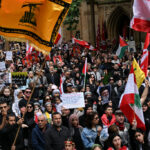Meta is placing restrictions on the use of the upside-down red triangle emoji, which is a reference to Hamas combat operations and has evolved into a symbol of Palestinian resistance, on its Facebook, Instagram, and WhatsApp platforms, as per internal content moderation materials reviewed by The Intercept.
During the Israeli assault on Gaza, Hamas frequently shared videos of successful strikes on Israeli military targets with red triangles overlaid on targeted soldiers and armor. The use of the red triangle emoji has since expanded online, becoming a widely recognized symbol for those expressing pro-Palestinian or anti-Israeli sentiments. Social media users have incorporated the symbol into their posts, usernames, and profiles as a sign of solidarity and protest. The symbol has gained enough popularity that even the Israeli military has used it in its propaganda as a reference to Hamas. In a video, the Israeli military warned Hamas’s spokesperson, “Our triangle is stronger than yours, Abu Obeida,” as reported by Al Jazeera in November.
As per internal policy guidelines obtained by The Intercept, Meta, the parent company of Facebook and Instagram, has deemed the upside-down triangle emoji as a representation of support for Hamas, a group classified under the company’s Dangerous Organizations and Individuals policy and designated as a terror group under U.S. law. While the rule applies to all users, it is only enforced in cases flagged internally for moderation. Users found using the emoji may face deletions of the symbol and potential disciplinary actions from Meta, depending on the severity of its usage.
According to the policy materials, Meta has banned contexts in which the red triangle is seen as a proxy for Hamas and is used to glorify, support, or represent the organization’s violence in posts related to the conflict.
Many questions regarding the policy remain unanswered, as Meta has not responded to multiple requests for comment. It is unclear how frequently Meta enforces restrictions on posts or accounts using the emoji, how many interventions have been made, and whether users have faced repercussions for violating the policy.
The policy also applies even if the emoji is used without violent speech or direct reference to Hamas. The documents indicate that Meta will remove any instances not related to Hamas’s violence, such as when the emoji is used as a profile picture. Another example of prohibited use includes a hashtag mentioning the word triangle and a Hamas spokesperson, rather than the emoji itself.
Evelyn Douek, an assistant professor at Stanford Law School and content moderation policy scholar, commented that the ban on any ‘reference’ to a designated DOI seems overly broad. She noted that discussions about Hamas or the use of the emoji may not necessarily be praise or glorification of the organization.
The previously unreported prohibition has raised concerns among digital rights advocates about the fair and accurate enforcement of the policy. Marwa Fatafta, a policy adviser with Access Now, expressed worries that Meta’s systems may not distinguish between different uses of the symbol, potentially affecting users unfairly under the DOI policy.
“Their systems will not be able to distinguish between the different uses of this symbol, and … those who are caught in this widely cast net will pay a hefty price.”
While Meta provides a general overview of the Dangerous Organizations policy, the specifics of who is included under it remain undisclosed, making it challenging for users to comply with the rule.
Mayssoun Sukarieh, a senior lecturer at King’s College London, stated, “What is being banned are expressions of solidarity and support for Palestinians as they are trying to resist ethnic cleansing and genocide. Symbols are always created by resistance, and there will be resistance as long as there is colonialism and occupation.”
Douek emphasized the importance of transparency in Meta’s content moderation policies, especially during times of conflict, to ensure fair enforcement without biases.
Despite Meta’s relaxation of the Dangerous Organizations policy in certain contexts, criticism remains regarding its enforcement against speech related to the war, particularly from Palestinian users. The policy materials reviewed by The Intercept do not mention exceptions for the triangle emoji or instructions to consider its context beyond Hamas.
Please rephrase
Source link





